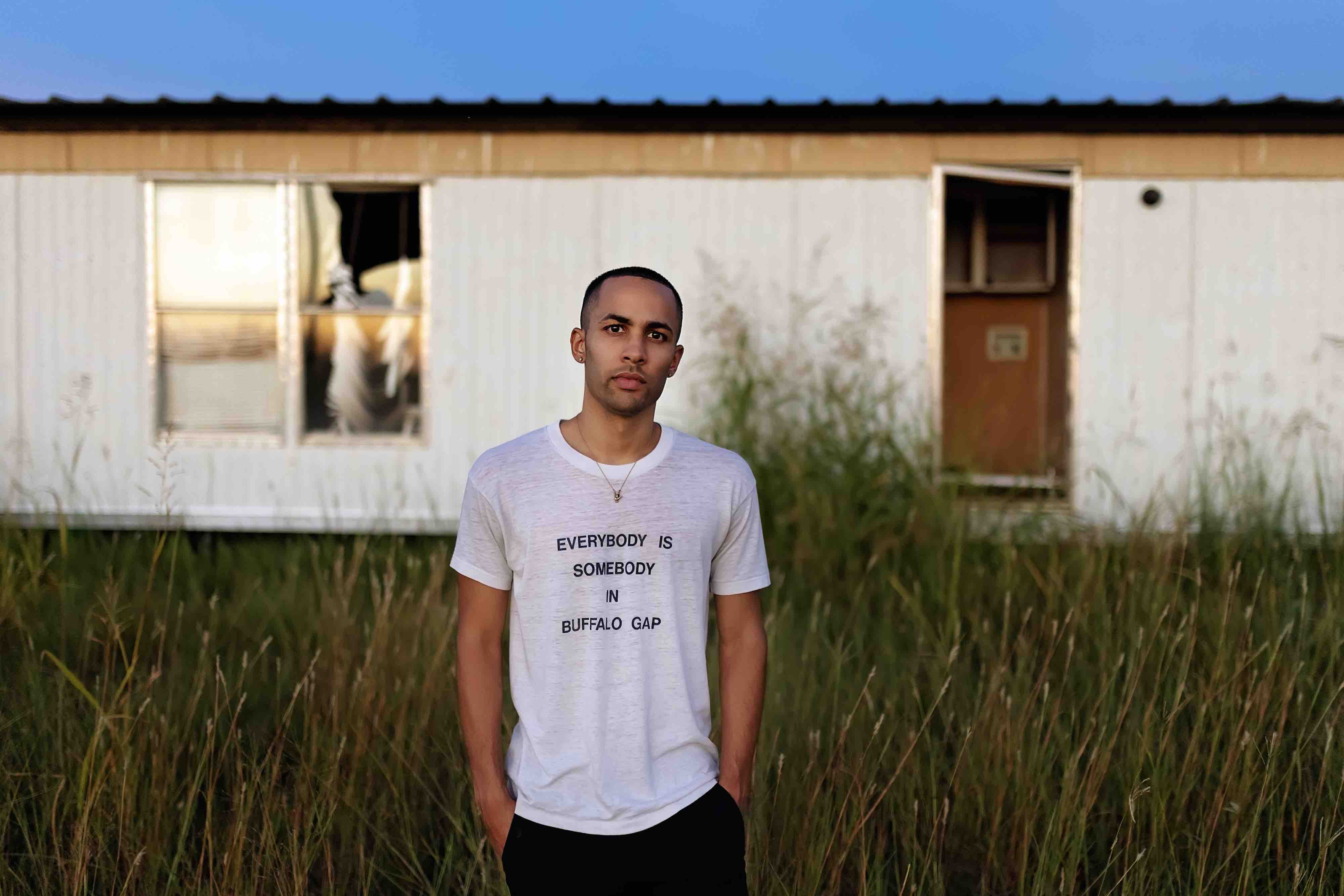Although he’s calling from Los Angeles, it’s clear from the opening moments—not to mention the title—of his new album The Devil Has Texas that Plato III has deep roots in the Central Texas town of Abilene. The project is introduced by the rapper’s new Polyvinyl labelmate Mike Kinsella replicating Daniel Johnston’s familiar rasp as he covers the late songwriter and emblem of the Lone Star State’s “Spirit World Rising” before Plato (born Ryan Silva) comes in with a quick verse giving a firsthand account of life in a desolate, poverty-stricken area within a historically Republican-governed state. “Seems I can’t just leave,” he raps cooly on the track which takes Johnston’s original title, “Bring my past with me.”
After physically moving to LA back in 2016 after a brief stint in Austin, it took a bit of time to process the culture shock of his new home. “The conversations I got into when I first got here were eye-opening,” he tells me, citing one particular example. “Everyone was talking about what their parents did, and I mentioned that my mom worked at a dollar store, and the response was like, ‘Oh, I’ve heard that you can actually really make some money franchising these stores, how many does she franchise?’” He laughs, clarifying to me that his mom’s a cashier. “In their defense, why would I be in this circle having this conversation with them? I’m like, woah, I’m kinda over my head here.”
“I was trying to resolve this thing that was happening in the country that I saw firsthand in Abilene, of these values that don’t really line up with the quality of life that you’d expect to come with faith and God.”
The move out West followed a bit of success Plato experienced emailing writers and publicists about his music (“I was like, ‘Oh, imagine if I lived in the town they all live in.’ It’s not the case—there’s a lot of people they can grab lunch with here”). But it was a trip back to Abilene at the beginning of the pandemic that sparked the idea for The Devil Has Texas, an album that swaps the rap conventions he’d previously pursued for interpolations of familiar songs by artists like Johnston and Modest Mouse. Paired with the nostalgia for the music he came up listening to was the realization that he felt connected to the people of Texas in a way he doesn’t quite experience in LA. “I feel so much more comfortable around them than I feel even in LA, even though my political views are more in line with the people here.”
The album, then, is his attempt to “sonically capture that”—both the comfort he feels with the sense of home Abilene provides him with and the discomfort at reckoning with the town’s overwhelming adherence to MAGA ideology. “I thought Abilene was a really good representation of things that were happening not just in Texas but in America that were kind of off for me,” he shares. “You have this bubbling up of religion and hyper-conservative values, but it’s also the lowest minimum wage—it’s a place where I experienced poverty, and a lot of people I grew up with experienced poverty. So I was trying to resolve this thing that was happening in the country that I saw firsthand in Abilene, of these values that don’t really line up with the quality of life that you’d expect to come with faith and God.”

One of the most interesting ways this sense of nostalgia seamlessly blends with religious themes is the album’s oddly spiritual centerpiece, a goofy palate cleanser titled “Summon the Based God” which does exactly that. “Hey, what’s up Plato?” comes the familiar rasp of Lil B, whose verse feels characteristically conversational alongside Plato’s. “He was someone me and my friends grew up listening to, and he was a common thread between us all,” Plato shares, explaining that B’s verse was originally planned for the album cut “Holiday” before he realized it was “too wild,” and worthy of “it’s own otherworldly event.” “As the Based God, he also has this sort of religious angle to him, so I thought if I was gonna condone any religion on this album as an alternative, then the religion of the Based World was the one that I was endorsing.”
“I thought if I was gonna condone any religion on this album as an alternative, then the religion of the Based World was the one that I was endorsing.”
Similarly, the sample of Modest Mouse’s “Trailer Trash” on “Sorry If I Dissed You” serves as more than a self-deprecating nod to Plato’s upbringing in a trailer park. With autobiographical lyrics as sobering as those of MM’s “Polar Opposites,” the instrumental supports the album’s core mission of creating a sense of setting out of sound. “This was the first time I was like, ‘What would it be like if Abilene was Chicago, or New York, and it had this rich musical history—what would it sound like?’” he explains. “Up until this point I kind of just had to borrow from Atlanta trap, or New York boom-bap, Houston was nearby with screw music, and I was always sort of a culmination of all those influences. I was like ‘I need to nail down a sound.’”
The Lonesome Crowded West, he explains, possessed that sound of “desolate and hopeless” he was looking for while addressing similar religious and cultural problems plaguing the South. Combined with Daniel Johnston’s documented history in Abilene, it quickly became clear that guitar music was crucial to the sound he was trying to nail down. To help him on that front, he enlisted his friend and fellow Abilener Phillip Odom, a guitarist who’d just produced the 2020 Portrayal of Guilt album We Are Always Alone—a much more aggressive take on desolation and hopelessness.
With all these connections to rock circles, it makes his status as the first rapper signed to Polyvinyl Records a little more logical. He’s quick to point out that unlike rock, rap suffers a lack of indie labels akin to Polyvinyl that feel approachable to artists with no connection to the label, as rap indies often also double as collectives—think Doomtree, which is also a rap group. “I’ve never slipped into the DM of an artist I support because I feel like that’s not how to do it,” he explains. “I’ve been to shows where I’ve watched, but are you supposed to, like, wait outside the show and try to talk to the person? I just felt like that was always uncomfortable for me. I never found out how to infiltrate those communities.”
“Up until this point I kind of just had to borrow from Atlanta trap, or New York boom bap, Houston was nearby with screw music, and I was always sort of a culmination of all those influences. I was like ‘I need to nail down a sound.’”
Regardless, he’s “fuckin’ stoked” to be onboard with Polyvinyl, even if there’s a tinge of guilt at having an in with the label. “I think it’s always who you know,” he shares, noting that it was his manager—another Abilener—who got him hooked up with the label. “Which has never worked to my advantage being someone from Abilene who knew nobody.” He mentions how a few other Abileners have hustled for their respective successes, with one friend waiting outside Maxo Kream’s studio overnight to score a feature, while Odom drove all the way to Philly to meet with Will Yip who ultimately helped launch his career.
Meanwhile Plato’s own cross-country journey to seek out creative opportunities has ironically taken him straight back to Texas. “No matter how far I go physically, I’m still spiritually connected to where I grew up. It’s a part of me that I wasn’t able to shed.” FL







